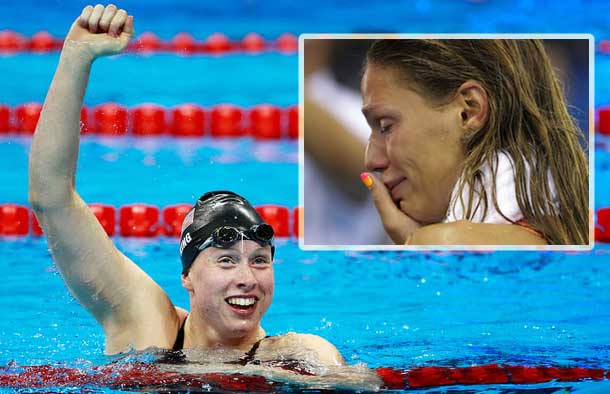Feels good, doesn’t it, to slap water in the face of the rest of the world and go all jingoist? Lilly King kept America strong and pure when she sent a blast of chlorine into the eyes of that Russian criminal mastermind Yulia Efimova and prevented her from melting the earth’s core. Or something like that, right? But there is a disquieting aspect to the narrative going here at the Olympics. It’s not a moment of perfect American moral clarity.
King, 19, is a swaggeringly great swimmer, but the rivalry between her and 24-year-old Efimova in the breaststroke is hardly a simple matter of a clean swimmer prevailing over “drug cheating,” as King put it. The facts of Efimova’s case aren’t nearly so clear cut despite the self-righteous Cold War shunning of her. It’s worth looking a little more closely at the human face of Efimova and maybe even standing in her place for a minute. As she suggested tearfully the other night, “You can just try and understand me, like if you switch you and I.”
For starters, Efimova doesn’t live in Russia; she lives in Los Angeles, where she has trained with Southern Cal Coach Dave Salo since she was 19. He says via email, “She is a sweet kid and not the monster she is being branded.” She was born in the war-torn Chechen capital of Grozny and raised in the Russian swim-club system in Volgodonsk, but in 2011, her coaches feared she was wearied by the grind of the Russian program, so they asked Salo to take her on.
Efimova has two offenses for performance-enhancing on her record, and let’s take a closer look at them. One day in 2013 she went to a local GNC in L.A. and bought a nutritional supplement. Her English was poor, and she didn’t check the contents, which included the banned hormone DHEA. Efimova’s offense was deemed unintentional, and the normal two-year suspension was reduced to 16 months.
No American would do such a thing, right? Actually, as NBC correspondent Alan Abrahamson has pointed out, Efimova’s case was very similar to that of Jessica Hardy, banned for ingesting a tainted supplement in 2008 only to win two medals at London 2012. No one splashed water in Hardy’s face or refused to shake her hand. …
Efimova is deemed a chronic cheat here mainly because of her second offense: testing positive for the heart medication meldonium in the midst of the crisis over the exposure of state-sponsored doping in Russia. Meldonium was in broad use by Eastern European athletes legally until WADA prohibited it in January 2016. This spring, WADA declined to ban more than 200 athletes who tested positive for meldonium after January, including Efimova, because it’s unclear how long it takes to clear the system. It’s quite possible that she obeyed the WADA ban but the medication remained in her system anyhow.
Efimova tried to explain these circumstances in her Olympic post-race news conference as King refused to look at her.
Fair Use Excerpt from Washington Post. Read whole article here.


